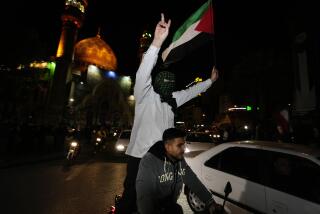Judge throws out Blackwater guards’ charges in Iraqi deaths
A federal judge in Washington on Thursday dismissed criminal charges against five Blackwater security guards accused of killing 17 unarmed Iraqi civilians in an incident that strained U.S.-Iraqi relations and sparked an outcry over the military’s use of private contractors.
The judge did not rule on the substance of the charges against the security guards, but instead decided that prosecutors had wrongly relied on what the guards told State Department investigators shortly after the incident. As government contractors, the Blackwater employees were required to speak to an investigator after a shooting.
U.S. District Judge Ricardo Urbina said that the use of these statements -- which were given with a promise of immunity -- violated the defendants’ rights against compelled self-incrimination.
“In their zeal to bring charges against the defendants . . . the government used compelled statements to guide its charging decisions . . . and ultimately, to obtain the indictment in this case,” the judge wrote in a 90-page opinion.
The efforts of prosecutors and investigators to show that their case did not hinge on compelled testimony “were all too often contradictory, unbelievable and lacking in credibility,” Urbina wrote.
Because the indictment was thrown out on legal grounds, the government could bring an appeal. It could also re-charge the guards, although a new prosecution could be difficult given the judge’s finding that the case was so thoroughly tainted.
Dean Boyd, a Justice Department spokesman, said, “We’re disappointed by the decision.” He added that the department was “still in the process of reviewing the opinion and considering our options.”
Rep. Jan Schakowsky (D-Ill.), who has in the past sponsored legislation that would prohibit the hire of private military contractors, said she was dismayed by the news.
“A question I’ve been asking for a long time is, ‘Can these private military contractors actually get away with murder?’ ” Schakowsky said. “This indicates that the answer is yes.”
“There’s a long history of these kinds of companies being able to operate with impunity,” she said.
The news of the dismissal reached Baghdad late Thursday night, prompting warnings that it could further damage U.S.-Iraqi relations.
“The message is these people are protected by the American administration,” said Kurdish lawmaker Mahmoud Othman. “These people were backed by the State Department. . . . We are entering the new year with a bad message.”
Othman warned: “People won’t be satisfied on the political or popular level.”
The five guards in the case were Paul Slough of Keller, Texas; Nicholas Slatten of Sparta, Tenn.; Evan Liberty of Rochester, N.H.; Dustin Heard of Maryville, Tenn.; and Donald Ball of West Valley City, Utah. Each had been charged with multiple counts of voluntary manslaughter and firearms violations.
A sixth guard, Jeremy P. Ridgeway, pleaded guilty to one count of voluntary manslaughter and helped authorities confirm the details of the incident. It is unclear what effect the judge’s decision will have on Ridgeway’s case.
The guards maintained that they had fired their weapons in response to an attack by insurgents. But according to U.S. prosecutors and an Iraqi government investigation, the shooting was unprovoked.
An FBI investigation found that at least 14 of the 17 Iraqis killed were shot without cause.
The September 2007 shooting in Baghdad’s Nisoor Square, which also wounded 20, put a harsh spotlight on the role of private security guards in the war there. Blackwater guards were hired to provide protection for U.S. officials, but they were not bound by all of the same rules and procedures as the U.S. military.
Before the incident, Blackwater guards had been involved in other shootings and were faulted for firing at unarmed civilians.
In their defense, the five guards in the Nisoor Square case said they were responding to reports of an explosive device detonating nearby as a convoy of U.S. officials approached the area.
The guards “were defending themselves and their comrades who were being shot at and receiving fire from Iraqis they believed to be enemy insurgents,” said defense attorney David Schertler at the time of their indictment in December 2007.
Government prosecutors disputed that the guards were returning fire.
“None of the victims of this shooting was armed,” said Jeffrey A. Taylor, the U.S. attorney in Washington, when he announced the indictment. “None was an insurgent.”
The five guards were not charged with murder but instead with voluntary manslaughter and firearms offenses.
Urbina, who was appointed by President Clinton, has a reputation as a liberal judge. Last year, he ordered the government to free 17 Chinese Uighurs who had been held at the Guantanamo Bay, Cuba, prison. The government refused, however, and the U.S. appeals court reversed his order.
In the Blackwater case, the judge convened a hearing in October to determine whether the indictment was tainted by the statements the guards had given during their initial interviews. The hearing stretched over three weeks.
He concluded Thursday that the “defendants’ compelled statements pervaded nearly every aspect of the government’s investigation and prosecution.”
For that reason, the entire indictment must be dismissed, he said. In his opinion, Judge Urbina cited the case of Lt. Col. Oliver L. North, whose conviction in the Iran-Contra case was overturned on similar grounds in 1990.
North was forced to testify under immunity before Congress, and he was later indicted and convicted by a special prosecutor. Although North’s actual words were not used against him, the U.S. appeals court said that the entire case was tainted because prosecutors were aware of his testimony.
Schakowsky, who had not yet read Urbina’s decision, said she would “investigate how various arms of the government tripped over themselves in this case.”
“We’re going to have to understand how this happened,” she said.
Schakowsky said she worried that the dismissal of charges in the Blackwater case would send a message to the rest of the world that the U.S. military and contractors will not be held accountable for crimes. She pointed out that soldiers and civilian contractors are often indistinguishable in war zones.
“I’ll be interested to see how the government of Iraq responds to this decision,” she said. “I think it will fuel anti-American sentiment.”
One survivor of the incident, a cabdriver named Bara Sadoun Ismail, who was shot twice, still held out hope that the guards would eventually be prosecuted.
“I don’t think it’s true that these five people have been released for lack of evidence,” he said. “The American justice [system] works. There is just delay.”
Separately, Blackwater and its founder, Erik Prince, have been sued in federal court by the victims of the Nisoor Square shooting.
According to the Center for Constitutional Rights, which brought the suit, the complaint alleged that Blackwater and Prince “created and fostered a culture of lawlessness among [Blackwater] employees, encouraging them to act in the company’s financial interests at the expense of innocent human life.”
Blackwater, which has changed its name to Xe Services, is seeking to have the suit dismissed.
Times staff writers Ned Parker in Baghdad and Kate Linthicum in Los Angeles contributed to this report.
More to Read
Start your day right
Sign up for Essential California for news, features and recommendations from the L.A. Times and beyond in your inbox six days a week.
You may occasionally receive promotional content from the Los Angeles Times.







